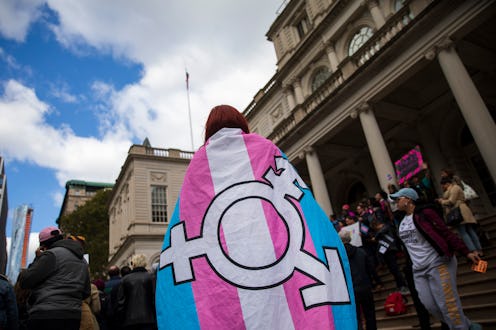News
Transgender Health Care Protections Are In Danger Of Being Wiped Out Under Trump

The Trump administration is currently working on a rule that could make it easier for health care providers to deny care to transgender people, according to multiple reports. If this rule goes into effect, transgender health care protections could be diminished in many parts of the country. Bustle spoke with a family medicine physician to better understand how the reported proposal could impact transgender people's access to health care.
According to CNN, the final rule of the Affordable Care Act explicitly implemented protections against discrimination on the basis of gender identity. The Obama-era rule clarified that both transgender people and gender non-conforming people were protected from discrimination when seeking health care services.
The Trump administration is supposedly planning to walk back these protections, CNN reported, by permitting health care providers to deny treatment to transgender or gender non-conforming patients on the basis of personal or religious beliefs.
Bustle reached out to the Department of Health and Human Services (HHS) for comment. In an email to CNN, its press office wrote, "We cannot go into further detail because these matters are subject to ongoing litigation, and rulemaking processes and procedures governed by the Administrative Procedure Act and subject to longstanding Executive Branch policy."
Dr. Meera Shah, who is a fellow with Physicians for Reproductive Health as well as the associate medical director for Planned Parenthood Hudson Peconic, tells Bustle that she regularly works with transgender and gender non-conforming patients. Now, she's concerned the reported proposal could increase the "significant barriers to accessing care" that these patients already face.
"What this rule is doing, it’s not protecting patients, it’s allowing providers to act on their own beliefs."
"Many of my patients have told me that they’ve previously been scared to go to see a physician or another health care provider because they fear being stigmatized," Shah says, "and so a rule like what the Trump administration is trying to impose will just make that worse. We should be protecting our patients — all patients of any gender identity, any sexual orientation — and making it so that they feel safe wherever they’re accessing care."
The HHS, however, is apparently aiming for a return to the past. "The United States has returned to its long-standing position that the term 'sex' ... does not refer to gender identity," HHS attorneys wrote in the court filings for a Texas lawsuit earlier this month, per The Washington Post.
But "the way that HHS is defining gender identity is not the way that the medical community defines gender identity," Shah says. Last year, multiple physicians told The New York Times that anatomy does not determine gender — and assuming that it does is an outdated view. "What this rule is doing, it’s not protecting patients, it’s allowing providers to act on their own beliefs," she adds.
Trans and gender non-conforming people already face numerous barriers to access when it comes to health care — not just social stigma, but also difficulty accessing insurance, NPR reported. In 2017, an NPR poll found that 22 percent of transgender individuals reported avoiding doctors or health care providers out of fear that they would face discrimination.
If the Trump administration implements this new rule, Shah says it would further aggravate those existing barriers to access. For example, if a trans person living in a conservative or rural area is turned away from a doctor or clinic, they may not have many other options to which they can turn. They also might not be able to afford to travel a great distance to access the care they need, as USA Today pointed out last year.
This is why Shah encourages advocates to be vocal in their opposition to this reported proposal, and reaffirms Planned Parenthood's commitment to providing care no matter what someone's gender identity is.
"Instead of breaking down protections for vulnerable people, we should be protecting them as much as we can in order to ensure that they are receiving basic access to health care, such as flu shots and cancer screenings and STI screenings and HIV prevention and treatment," Shah says, "or this could potentially worsen the health status of certain people, so I’m disgusted by this proposal."